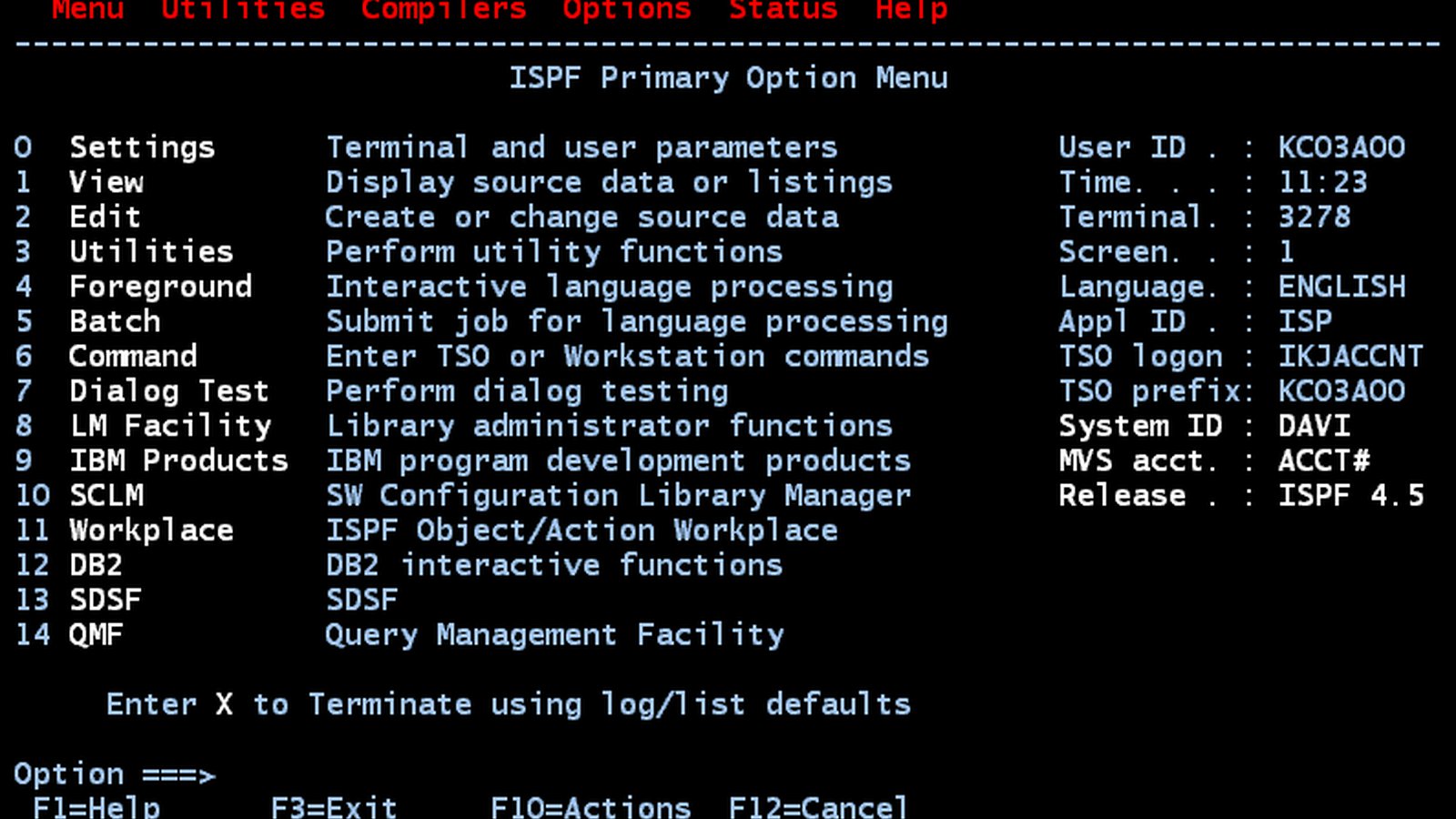
Dealing with microfocus sequential files in linux shell
Copy a microfocus enterprise server dataset, edit it and return it back to the server.
Using linux shell and all its powerfull tools in order to deal with microfocus sequential files living in a remote linux server is the subject of this post.
The steps we need to open such a file in linux are:
scp to local machine
recode from EBCDIC to ASCII
add new line characters (LF)
view or edit
To save the file back to the server (after edit) we do:
add blanks at the end of each line
truncate new line characters
recode from ASCII to EBCDIC
scp to remote server
The following sample script (name it mf) does the job using identity key for non interactive ssh logins. Encoding is IBM-875 (EBCDIC-Greek) remotely and ISO-8859-7 (ASCII-Greek) localy.
mf
#!/bin/bash HOST=mfserver KEY=~/.ssh/id_rsa_mfserver DATAPATH=/mrh/prod/data/ LOCALTMP=/home/oper1/shit USER=mfadmin COMMAND=$1 INPUTFILE=$2 RLENGTH=$3 export LC_ALL=el_GR.ISO-8859-7 if [ $COMMAND = "vi" ] then ssh -i $KEY $USER@$HOST "cat $DATAPATH$INPUTFILE.DAT" | recode EBCDIC-Greek..ISO-8859-7 > $INPUTFILE fold -w $RLENGTH $INPUTFILE > $INPUTFILE.TMP $COMMAND $INPUTFILE.TMP awk 'length <= '$RLENGTH' { printf "%-'$RLENGTH's\n",$0 }' $INPUTFILE.TMP > $INPUTFILE.TMP1 tr -d '\n' < $INPUTFILE.TMP1 > $INPUTFILE recode ISO-8859-7..EBCDIC-Greek $INPUTFILE scp -q -i $KEY ./$INPUTFILE $USER@$HOST:$DATAPATH$INPUTFILE.DAT rm $INPUTFILE.* exit elif [ $COMMAND = "savecat" ] then dos2unix -q $INPUTFILE awk 'length <= '$RLENGTH' { printf "%-'$RLENGTH's\n",$0 }' $INPUTFILE > $INPUTFILE.TMP1 tr -d '\n' < $INPUTFILE.TMP1 > $INPUTFILE.TMP2 recode ISO-8859-7..EBCDIC-Greek $INPUTFILE.TMP2 scp -q -i $KEY ./$INPUTFILE.TMP2 $USER@$HOST:$DATAPATH$INPUTFILE.DAT rm $INPUTFILE.TMP? cat > $LOCALTMP/CATALOG.JCL <<CATALOGJCL //CATJOB JOB MFCAT CLASS=L LINUX JOB //CATALOG EXEC PGM=MFJBR14 //D1 DD DISP=(,CATLG),RECFM=F,DSORG=PS,LRECL=$RLENGTH, // DSN=$INPUTFILE CATALOGJCL export MFBSI_DIR=/mrh/mfbsi/PROD . $COBDIR/bin/cobsetenv mfbsijcl -j"$LOCALTMP/CATALOG.JCL" rm $LOCALTMP/CATALOG.JCL exit elif [ $COMMAND = "save" ] then dos2unix -q $INPUTFILE awk 'length <= '$RLENGTH' { printf "%-'$RLENGTH's\n",$0 }' $INPUTFILE > $INPUTFILE.TMP1 tr -d '\n' < $INPUTFILE.TMP1 > $INPUTFILE.TMP2 recode ISO-8859-7..EBCDIC-Greek $INPUTFILE.TMP2 scp -q -i $KEY ./$INPUTFILE.TMP2 $USER@$HOST:$DATAPATH$INPUTFILE.DAT rm $INPUTFILE.TMP? exit elif [ $COMMAND = "get" ] then ssh -i $KEY $USER@$HOST "cat $DATAPATH$INPUTFILE.DAT" | recode EBCDIC-Greek..ISO-8859-7 > $INPUTFILE.TMP fold -w $RLENGTH $INPUTFILE.TMP > ./$INPUTFILE rm $INPUTFILE.TMP else ssh -i $KEY $USER@$HOST "cat $DATAPATH$INPUTFILE.DAT" | recode EBCDIC-Greek..ISO-8859-7 > $INPUTFILE fold -w $RLENGTH $INPUTFILE | $COMMAND echo rm $INPUTFILE fi exit 0
Usage
$~ mf <linux/custom command> <microfocus dataset name> <record length>
The "to-do list" contains the functionality to get the file's record length from catalog automaticaly. We are planning to publish this in a future post.
- Posted by Kostas Koutsogiannopoulos · Oct. 27, 2015

